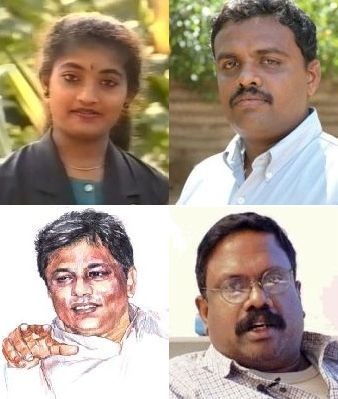 |
| Four Murdered Sri Lanka journalists we have covered. Clockwise from top left: Shoba Isaippiriya, Punniyamurthy Sathyamurthy, Dharmaretnam Sivaram and Lasantha Wickrematunge. From the report: Sri Lanka Tamil Genocide: Killing the Messenger |
(Salem-News.com) Reporters Without Borders (RSF- Reporters Sans Frontieres) appeals to all members of the Geneva-based United Nations Human Rights Council (UNHRC), to pass a motion denouncing the Sri Lankan government’s breach of freedom of information and to demand an end to threats, violence and harassment against media and media persons in Sri Lanka.
In its media release, “For more than a year we have been seeing new forms of censorship and deterioration in journalists’ ability to work although the war with the Liberation Tigers of Tamil Eelam (LTTE) officially ended in 2009,” Reporters Without Borders said.
“Rather than wait until the Universal Periodic Review to make recommendations, the Human Rights Council’s members should adopt a resolution now urging the government to take measures to improve freedom of information.”
“The number of cases of physical attacks, death threats and imprisonment may have fallen in 2010 and 2011, but the authorities continue to prevent the media from enjoying real editorial freedom and many media persons are still in exile. Sri Lankan and foreign media are still unable to cover the issue of war crimes, which will be at the Centre of the Human Rights Council’s discussions during the on-going 19th session in Geneva.”
“An immediate reaction is needed to the obstruction of journalists who want to cover the activities of the Lessons Learned and Reconciliation Commission (LLRC) and to self-censorship on this subject for fear of reprisals. The Human Rights Council must remind the Sri Lankan government of the importance of the media’s role as a critic and urge it to respect freedom of information. We call on the government to accept constructive questions from civil society and to stop branding its critics as ‘conspirators’ and ‘LTTE accomplices’.”
A brief account at the order of events chronicling threats to media from Jan – Feb 2012:
Since Feb 25: Distributed Denial-of-Service Attacks (DDoS) have been disturbing web traffic of a leading website in Sri Lanka.
Feb 23: Four leading independent news websites have been blocked since 6 November on the orders of the information ministry that all news websites with “any content relating to Sri Lanka” require to register with the ministry.
Feb 16: The defence ministry posted an article on its website accusing Journalists for Democracy in Sri Lanka (JDS), of “treachery and conspiracy” against the government and security forces prior to the inaugural of the Human Rights Council’s 19th session.
Feb 15: Prasad Purnimal Jayamanne, a freelance journalist, a member of the South Asian Free Media Association (SAFMA), was badly beaten while filming a demonstration by fishermen in Chilaw, 100 km north of Colombo, in protest against the death of a fisherman at the hands of the police.
Feb 8: The state-owned daily Dinamina accused the Free Media Movement of obstructing democracy in Sri Lanka, giving the country a bad image, and inciting separatism and terrorism.
Jan26-27: Media minister Keheliya Rambukwella accused journalists of collaborating with the LTTE, foreign media and NGOs in order to smear Sri Lanka’s image.
Jan 25: After the Alliance of Media Organizations in Sri Lanka held a “Black January” demonstration, some of the demonstration’s planners were followed by faceless individuals for many days.
In the Press Freedom Index for the year 2011-’12 released by RSF, Sri Lanka ranks 163, lower down in the list of 179 countries.
Salem-News.com
(For updates you can share with your friends, follow TNN on Facebook and Twitter )
